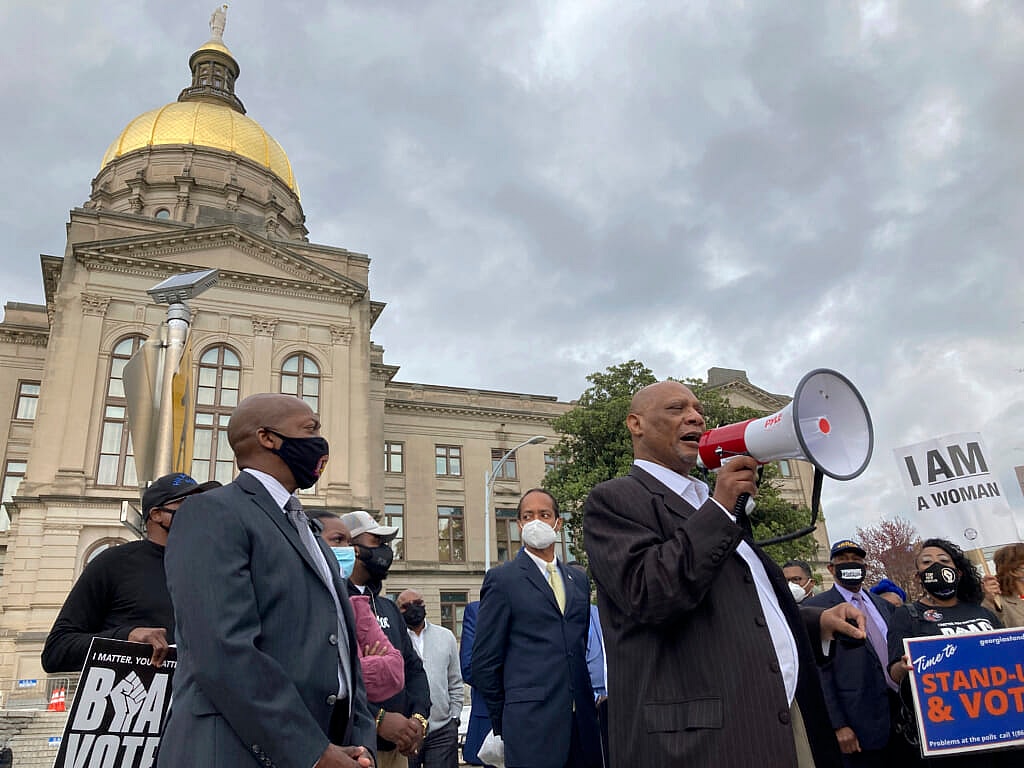Georgia Gov. Brian Kemp on Thursday signed into law a sweeping Republican-sponsored overhaul of state elections that includes new restrictions on voting by mail and gives the legislature greater control over how elections are run.
Democrats and voting rights groups say the law will disproportionately disenfranchise voters of color. It is part of a wave of GOP-backed election bills introduced in states around the nation after former President Donald Trump stoked false claims that fraud led to his 2020 election defeat.

Read More: Georgia Republicans want to make it a crime to give food, drinks to voters in line
Republican changes to voting laws in Georgia follow record-breaking turnout that led to Democratic victories in the presidential contest and two U.S. Senate runoffs in the once reliably red state.
Kemp signed the bill less than two hours after it received final passage in the Georgia General Assembly. The bill passed the state House 100-75 earlier Thursday, before the state Senate quickly agreed to House changes 34-20. Republicans in the legislature were in support, while Democrats were opposed.
Democratic Senate Minority Leader Gloria Butler said the bill was filled with “voter suppression tactics.”
“We are witnessing right now a massive and unabashed assault on voting rights unlike anything we’ve seen since the Jim Crow era,” Butler added.

Democratic Rep. Rhonda Burnough said the bill was based on lies told by Republicans after last November’s election.
“Georgians turned out in record-breaking numbers because they could access the ballot,” Burnough said. “Lies upon lies were told about our elections in response, and now this bill is before us built on those same lies.”
Among highlights, the law requires a photo ID in order to vote absentee by mail, after more than 1.3 million Georgia voters used that option during the COVID-19 pandemic. It also cuts the time people have to request an absentee ballot and limits where ballot drop boxes can be placed and when they can be accessed.
Republican Rep. Jan Jones said the provisions cutting the time people have to request an absentee ballot are meant to “increase the likelihood of a voter’s vote being cast successfully,” after concerns were raised in 2020 about mail ballots not being received by counties in time to be counted.
One of the biggest changes gives the GOP-controlled legislature more control over election administration, a change that has raised concerns among voting rights groups that it could lead to greater partisan influence.
The law replaces the elected secretary of state as the chair of the state election board with a new appointee of the legislature after Republican Secretary of State Brad Raffensperger rebuffed Trump’s attempts to overturn Georgia’s election results. It also allows the board to remove and replace county election officials deemed to be underperforming.

That provision is widely seen as something that could be used to target Fulton County, a Democratic stronghold covering most of Atlanta, which came under fire after long lines plagued primary elections over the summer.
Republican Rep. Barry Fleming, a driving force in crafting the law, said that provision would only be a “temporary fix, so to speak, that ends and the control is turned back over to the locals after the problems are resolved.”
The law also reduces the timeframe in which runoff elections are held, including the amount of early voting for runoffs. And it bars outside groups from handing out food or water to people standing in line to vote.
The law does not contain some of the more contentious proposals floated by Republicans earlier in the session, including limits on early voting on Sundays, a popular day for Black churchgoers to vote in “souls to the polls” events. It instead mandates two Saturdays of early voting ahead of general elections, when only one had been mandatory, and leave two Sundays as optional.
But those changes haven’t tempered opposition from Democrats or voting rights groups.
About 50 protesters including representatives from the NAACP gathered across from the Capitol building Thursday in opposition.
During the rally, Bishop Reginald Jackson of the African Methodist Episcopal Church called for a boycott of Coca-Cola Co. products.
Jackson, who leads more than 400 churches across Georgia, said the Atlanta-based soft drink company had failed to live up to the commitments it made last year to support the Black Lives Matter movement by not forcefully opposing the voting bills pushed by Republicans.
“We took them at his word,” he said of Coca-Cola CEO James Quincey. “Now, when they try to pass this racist legislation, we can’t get him to say anything.”
Jackson said boycotts also were possible against other large locally based companies such as Delta Air Lines and Home Depot.
The Georgia Chamber of Commerce and the Metro Atlanta Chamber of Commerce pushed against some proposals Republicans later dropped, including eliminating no-excuse absentee voting. But the business lobbies and top Atlanta corporations have not vocally opposed all changes.
Have you subscribed to theGrio’s podcast “Dear Culture”? Download our newest episodes now!
TheGrio is now on Apple TV, Amazon Fire, and Roku. Download theGrio today!

